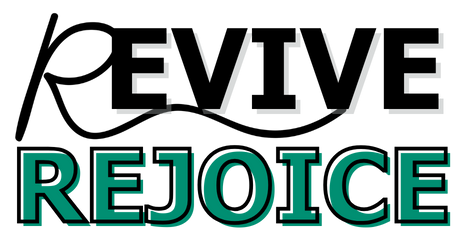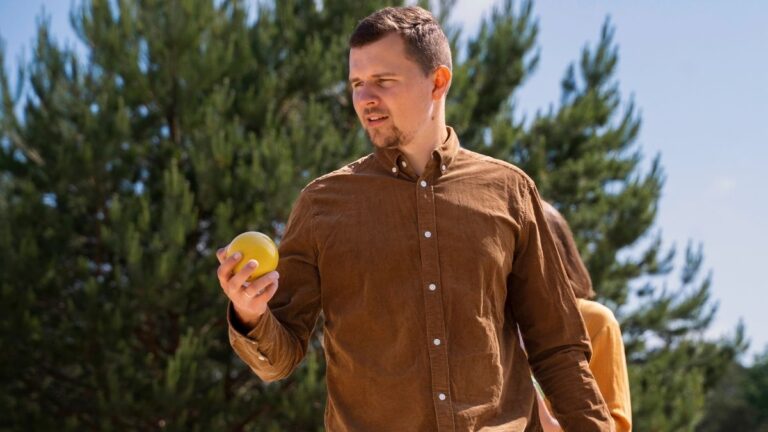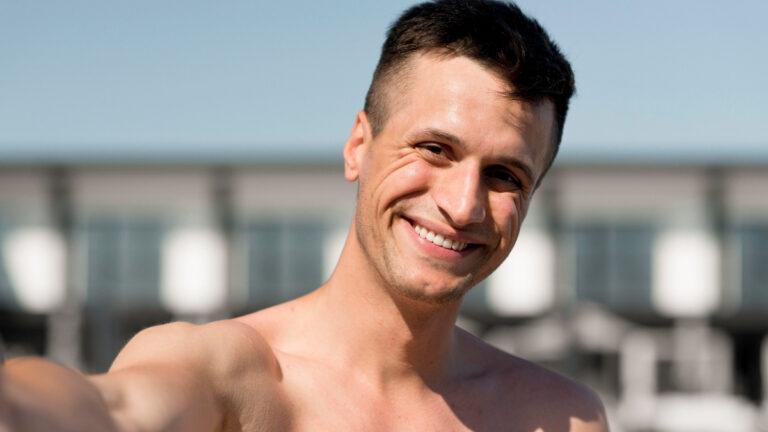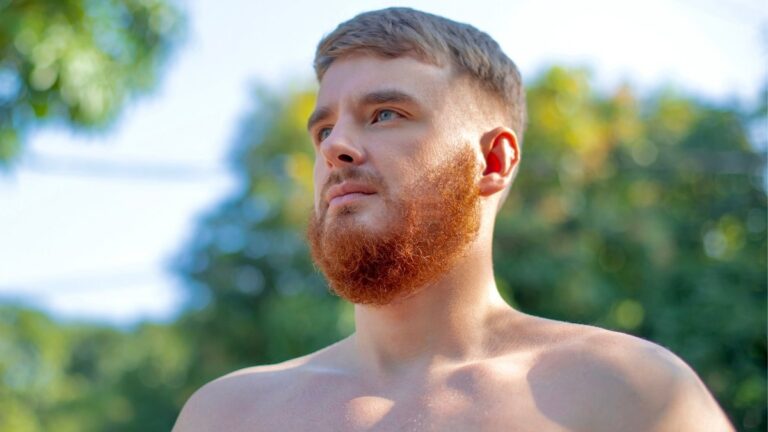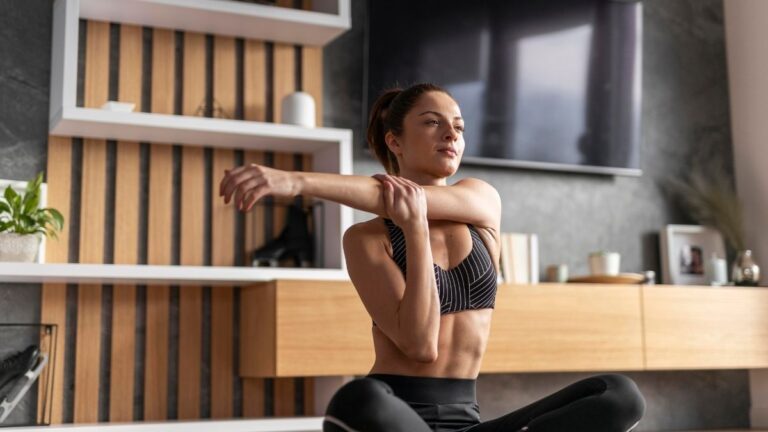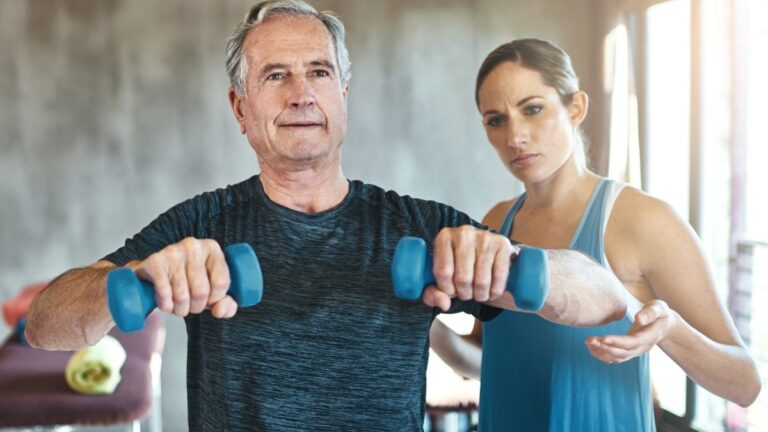These 15 secret cool-down moves will eliminate soreness instantly, says top fitness trainer
That burning sensation in your muscles after a tough workout isn’t just discomfort—it’s your body crying out for proper recovery. Unfortunately, many fitness enthusiasts skip cool-downs entirely, leading to increased soreness, stiffness, and significantly slower recovery times.
This common oversight can dramatically impact your fitness progress and overall well-being long-term. In this comprehensive guide, you’ll discover 15 specific cool-down exercises that effectively reduce muscle soreness, improve flexibility, and enhance your recovery process naturally.
These essential post-workout stretches and muscle recovery exercises, recommended by certified fitness trainers, will completely transform how your body feels after every single workout session from this day forward permanently.
The 5 Best Upper Body Cool-Down Exercises
Your shoulders feel tight. Your chest is sore. Your neck won’t turn right. Sound familiar?
Muscle Recovery Scan
UPPER BODY SEQUENCE
After a tough upper-body workout, your muscles need help. They’re bunched up and need to relax. Skip cool-down exercises, and you’ll pay for it tomorrow with stiffness and pain.
These five upper-body stretches will save you from that misery. They target the muscles that work hardest during your workout. Do them right after training, and your body will thank you.
1. Chest Doorway Stretch
What it targets: Chest muscles and front shoulders
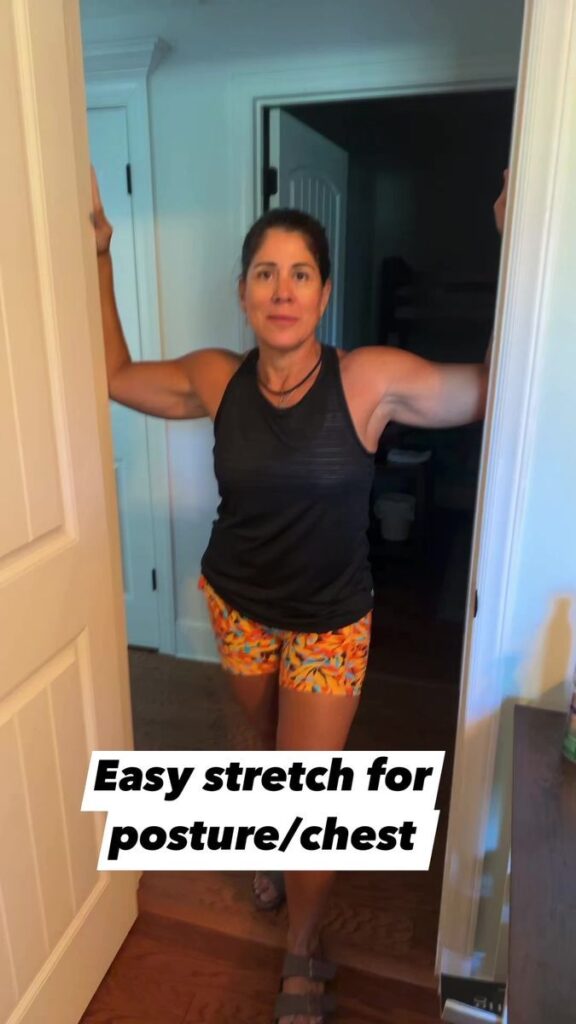
Your chest muscles get super tight from push-ups and bench press. This stretch opens them back up.
How to do it:
- Stand in a doorway
- Put your right arm against the door frame at shoulder height
- Step forward with your right foot
- Feel the stretch across your chest
- Hold for 30 seconds
- Switch arms and repeat
Common mistake: Don’t push too hard. A gentle stretch works better than forcing it.
2. Overhead Tricep Stretch
What it targets: Back of your arms (triceps)
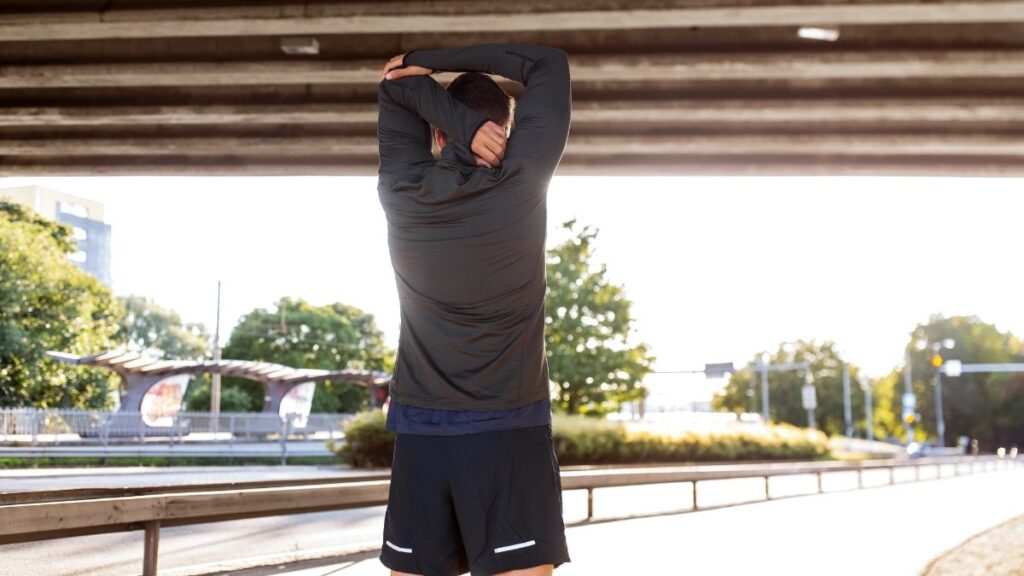
Triceps work hard during pressing movements. They need this stretch to release tension.
How to do it:
- Raise your right arm over your head
- Bend your elbow so your hand touches your upper back
- Use your left hand to gently pull your elbow
- Hold for 30 seconds
- Switch arms
Common mistake: Don’t yank on your elbow. Light pressure is enough.
3. Cross-Body Shoulder Stretch
What it targets: Shoulders and upper back
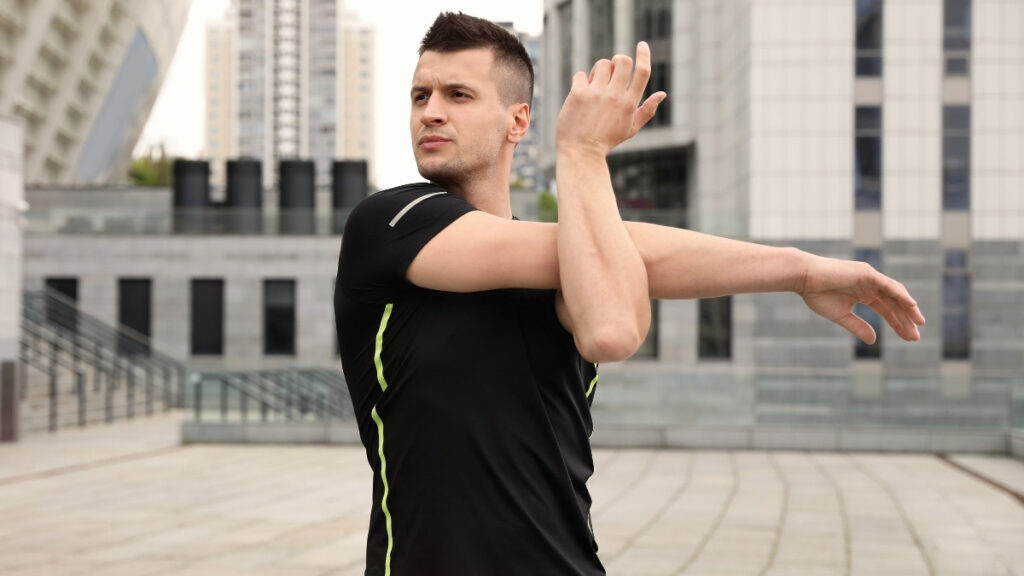
This stretch hits muscles that rowing and pulling exercises work hard.
How to do it:
- Bring your right arm across your chest
- Hook your left arm under your right elbow
- Pull your right arm closer to your body
- Hold for 30 seconds
- Switch arms
Common mistake: Don’t lift your shoulder up to your ear. Keep it down and relaxed.
4. Neck Rolls
What it targets: Neck muscles and upper traps
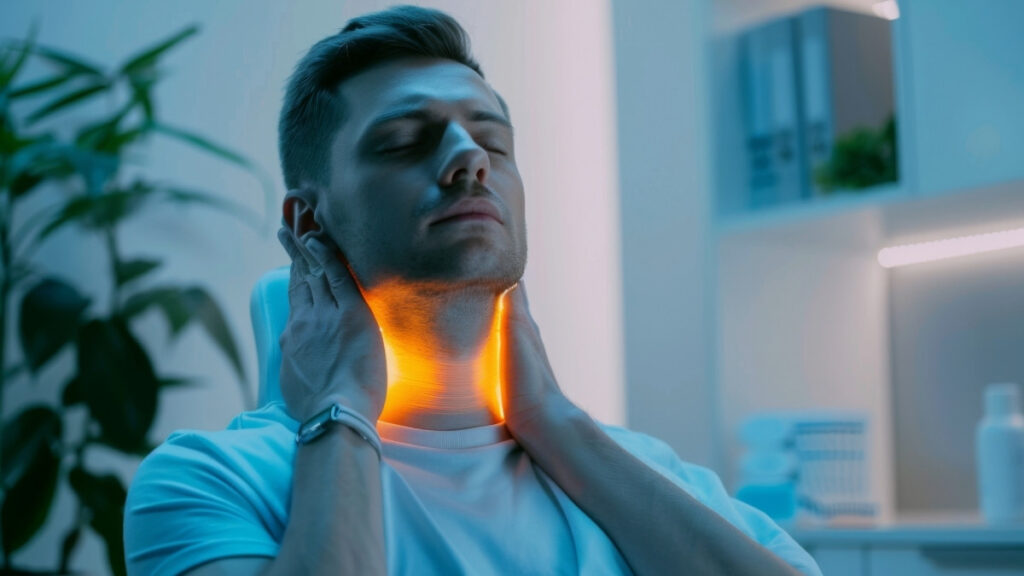
Your neck holds tension from heavy lifting and poor form. These rolls help it relax.
How to do it:
- Start with your head in normal position
- Slowly drop your right ear to your right shoulder
- Roll your head forward, chin to chest
- Continue rolling to the left side
- Roll back to center
- Do 5 slow rolls each direction
Common mistake: Don’t roll your head backward. Only go side to side and forward.
5. Upper Trap Stretch
What it targets: Top of your shoulders and neck
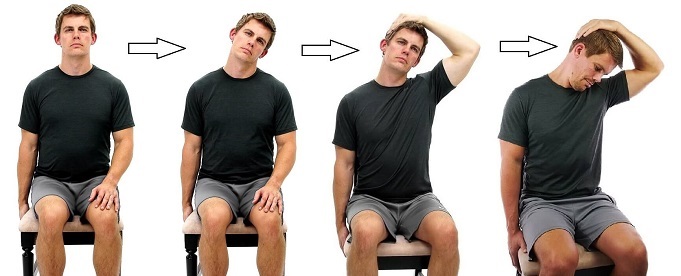
These muscles get tight from shrugging and overhead movements.
How to do it:
- Sit or stand tall
- Tilt your head to the right
- Put your right hand on top of your head
- Gently pull your head further to the right
- Hold for 30 seconds
- Switch sides
Common mistake: Don’t pull hard. Your muscles need gentle coaxing, not force.
Make It Work
Do these cool-down exercises right after your workout. Your muscles are still warm, so they’ll stretch better. Hold each stretch for the full 30 seconds. Rushing through them won’t help.
Your upper body works hard for you. These five stretches are your way of returning the favor. They’ll keep you feeling good and ready for your next workout.
Skip them, and you’ll regret it when you can barely lift your arms tomorrow.
5 Essential Lower Body Cool-Down Exercises
Your legs feel like concrete after that workout. Your quads are tight. Your calves are screaming. And tomorrow? You know you’ll barely be able to walk down stairs.
This happens because your muscles contract during exercise and stay that way afterward. Without proper post-workout stretches, they’ll stay tight and sore for days. That’s where a good flexibility routine saves you.
These five stretches target the biggest problem areas after lower body workouts. Do them right after you finish exercising, while your muscles are still warm. Hold each stretch for 30 seconds and breathe normally.
1. Standing Quad Stretch
Stand next to a wall for balance. Bend your right knee and grab your ankle behind you. Pull your heel toward your glutes gently. You should feel the stretch in the front of your thigh.
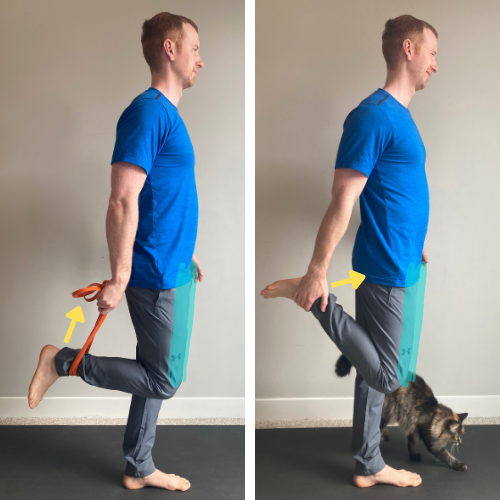
Keep your knees close together. Don’t let your knee drift out to the side. If you can’t reach your ankle, loop a towel around your foot and pull on that instead.
Switch legs and repeat. This stretch hits your quads hard after squats, lunges, and running.
2. Seated Hamstring Stretch
Sit on the floor with one leg straight out in front of you. Bend your other leg and place the bottom of that foot against your inner thigh. Slowly lean forward over your straight leg.
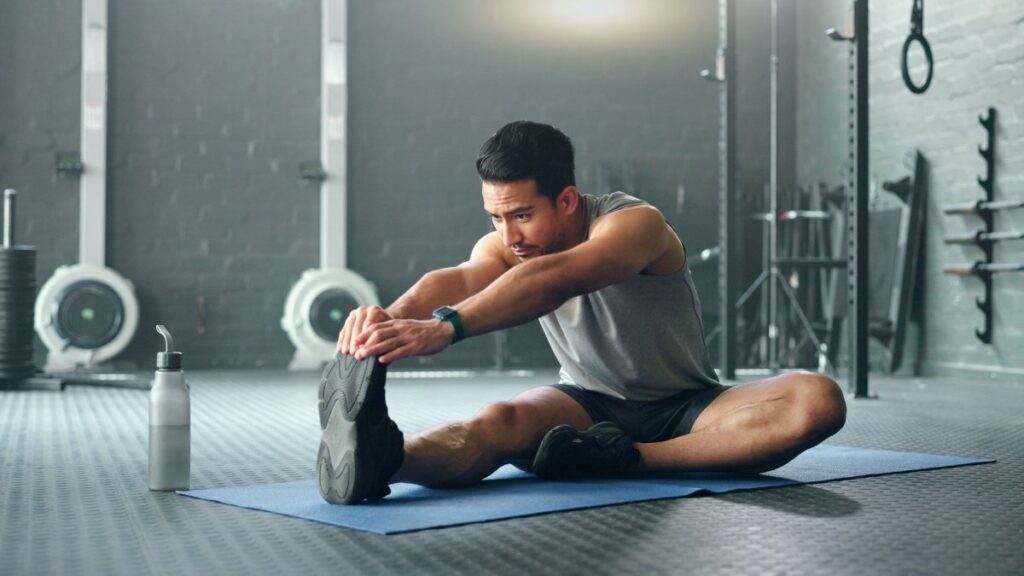
Reach for your toes, but don’t force it. Go only as far as feels good. You’ll feel this stretch in the back of your thigh and maybe your calf too.
Your hamstrings get hammered during deadlifts and sprints. This stretch gives them the relief they need. Hold it, then switch sides.
3. Calf Stretch Against Wall
Stand arm’s length from a wall. Put your hands flat against it. Step your right foot back about three feet. Keep that back leg straight and press your heel into the ground.
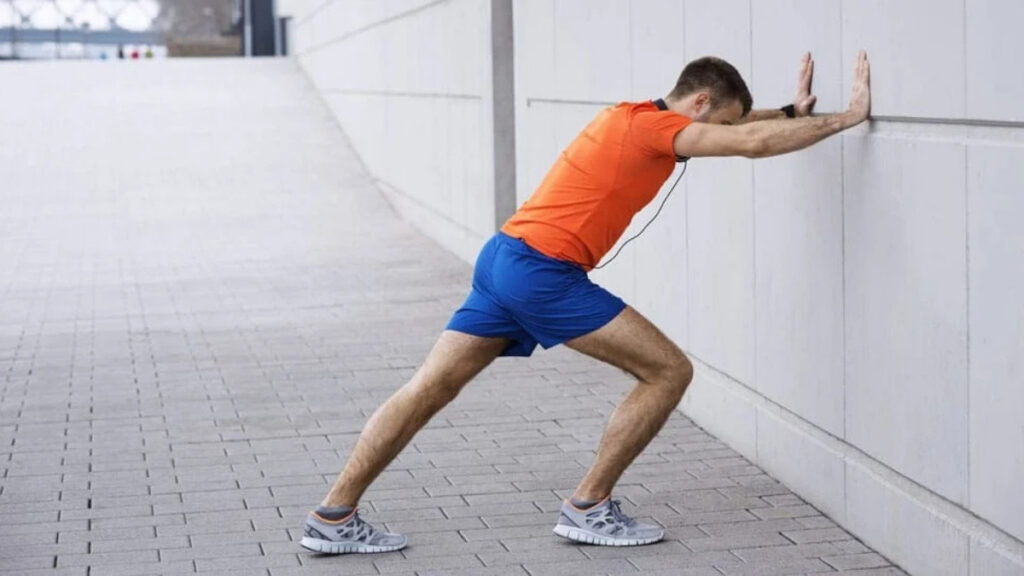
Lean into the wall until you feel the stretch in your back calf. Your front knee can bend, but keep that back leg straight. This targets your gastrocnemius muscle.
For your deeper calf muscle, bend your back knee slightly while keeping your heel down. This hits your soleus muscle. Switch legs after 30 seconds.
4. Hip Flexor Lunge Stretch
Start in a lunge position with your right foot forward. Lower your back knee to the ground. Keep your front knee over your ankle, not pushed forward past your toes.
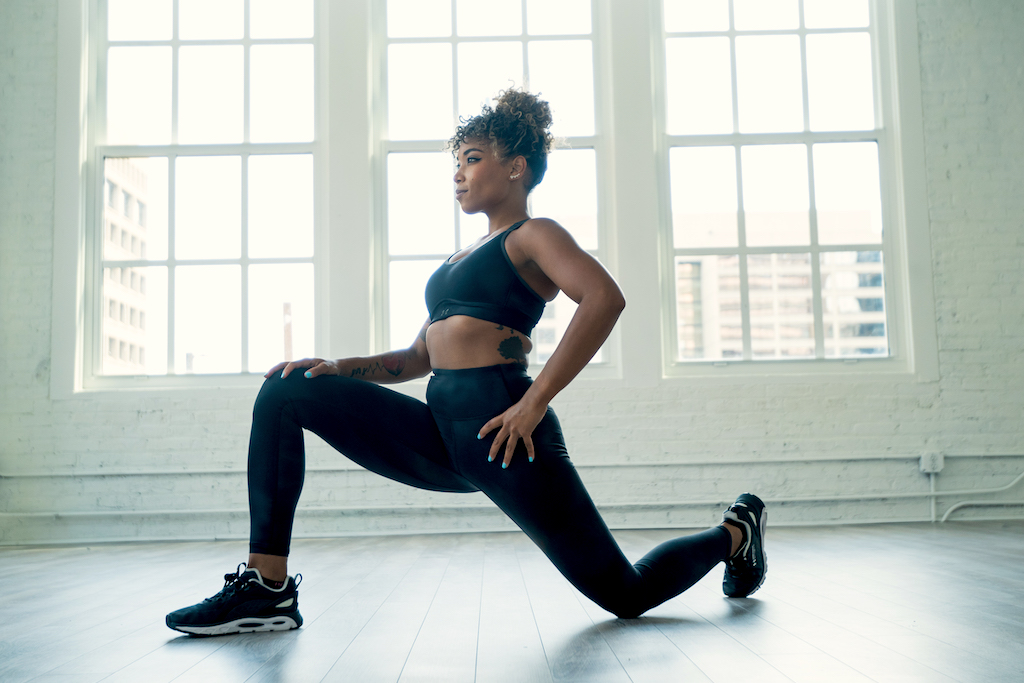
Gently push your hips forward. You’ll feel this stretch in the front of your hip and thigh on your back leg. These muscles get tight from sitting all day, then get worked hard during squats and lunges.
Place your hands on your front thigh for support. Keep your chest up and core engaged. Switch sides after 30 seconds.
5. Pigeon Pose
Start on your hands and knees. Bring your right knee forward and place it behind your right wrist. Slide your left leg back and straighten it behind you.
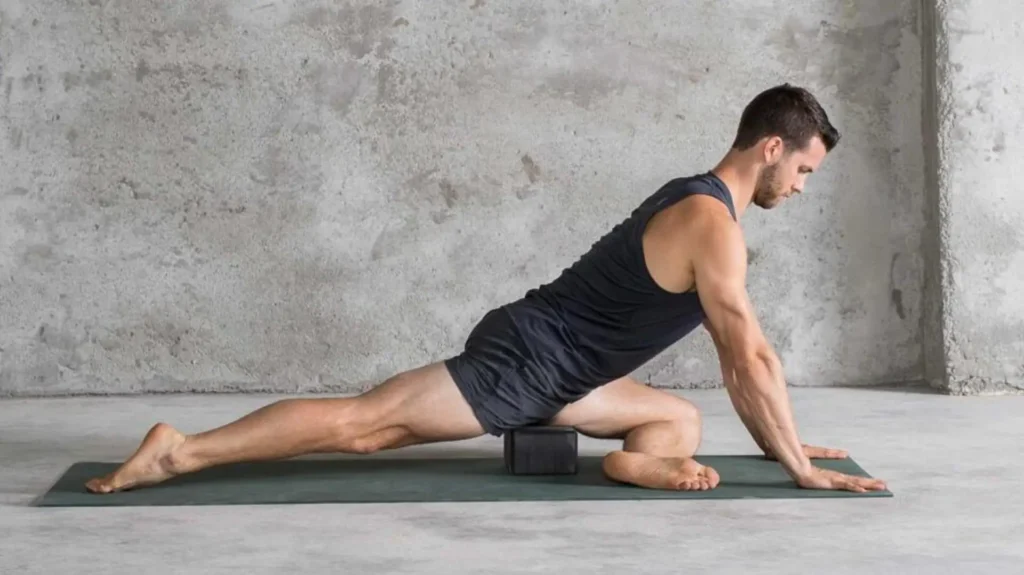
Lower your hips toward the floor. If this feels too intense, place a pillow under your right hip. You can stay upright with your hands supporting you, or fold forward over your front leg for a deeper stretch.
This stretch opens up your hips and glutes. After heavy squats or deadlifts, your hips lock up tight. Pigeon pose unlocks them.
Why This Flexibility Routine Works
These post-workout stretches target every major muscle group you just worked. Your quads, hamstrings, calves, hip flexors, and glutes all get the attention they need.
Stretching when your muscles are warm helps them return to their normal length. This reduces soreness tomorrow and keeps you moving well. Skip the stretches, and you’ll pay for it later.
Take five minutes now to do these stretches. Your body will thank you tomorrow morning when you can actually get out of bed without groaning.
5 Full-Body Cool-Down Exercises for Complete Recovery
Your muscles are screaming. Your heart is pounding. You just crushed that workout, but now what?
Skipping your cool-down is like slamming on the brakes after highway driving. Your body needs time to slow down safely. These muscle recovery exercises help your heart rate drop gradually and prevent that stiff, sore feeling tomorrow.
Here are five cool-down exercises that work your entire body. Do them right after any workout, and your muscles will thank you.
1. Child’s Pose
Kneel on the floor with your big toes touching. Spread your knees wide and sit back on your heels. Fold forward and stretch your arms out in front of you. Rest your forehead on the ground.
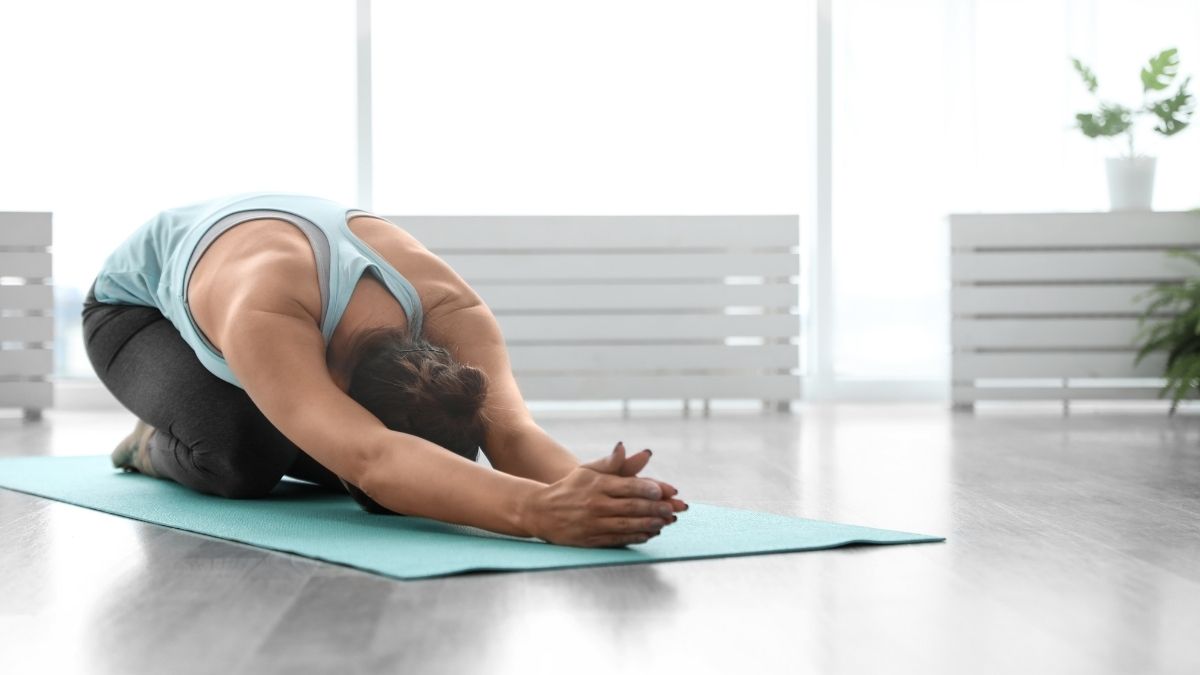
Hold this for 30 to 60 seconds. This gentle stretch relaxes your back, hips, and shoulders all at once. It also helps calm your mind after an intense workout.
2. Cat-Cow Stretch
Get on your hands and knees. Keep your wrists under your shoulders and knees under your hips. Arch your back and look up (cow position). Then round your spine and tuck your chin to your chest (cat position).
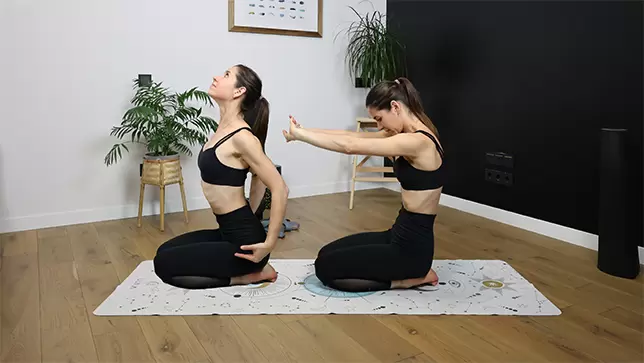
Move slowly between these positions 10 to 15 times. This mobilizes your entire spine and feels amazing after deadlifts or squats.
3. Spinal Twist
Sit on the floor with your legs straight. Bend your right knee and place your right foot on the outside of your left thigh. Put your left elbow against your right knee and twist to the right. Hold for 30 seconds, then switch sides.
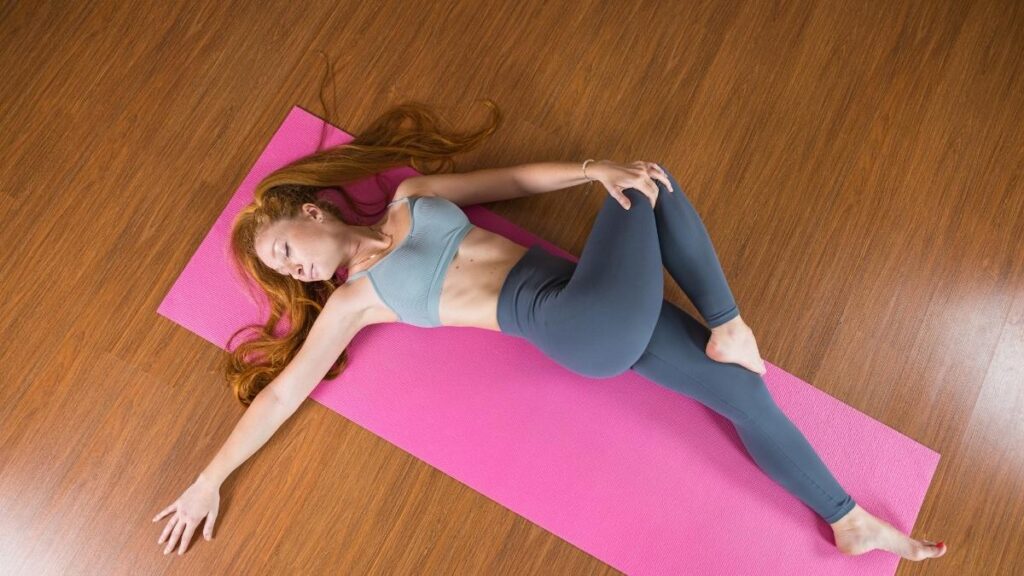
This stretch targets your lower back and helps release tension in your core muscles. It’s perfect after any workout that works your abs or back.
4. Forward Fold
Stand with your feet hip-width apart. Slowly fold forward from your hips, letting your arms hang down. Don’t worry if you can’t touch your toes. Just let gravity do the work.
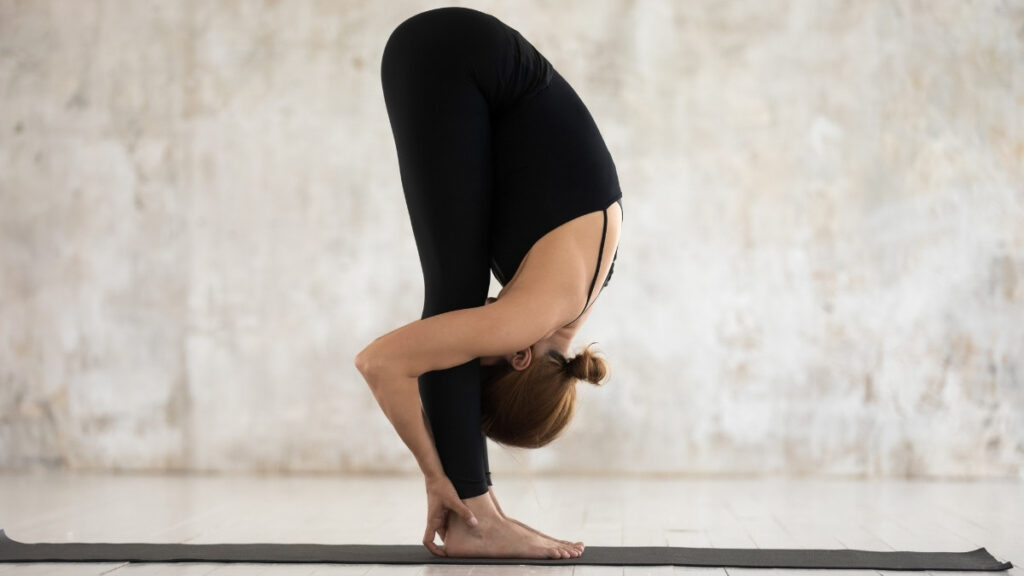
Hold for 30 to 45 seconds. This stretches your hamstrings, calves, and lower back. It also helps blood flow back to your heart.
5. Legs Up the Wall
Lie on your back near a wall. Scoot your butt close to the wall and extend your legs straight up against it. Let your arms rest by your sides.
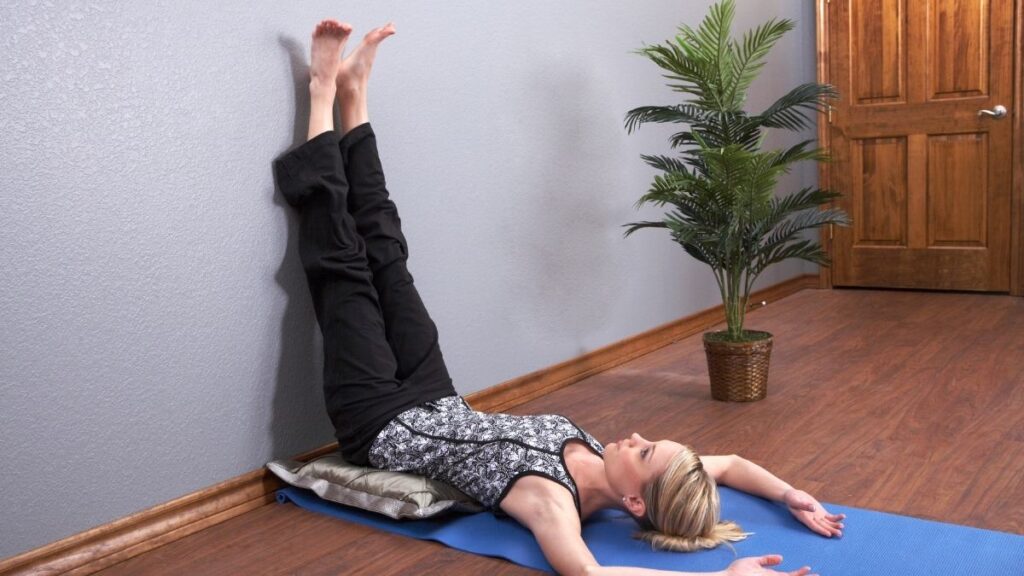
Stay here for 3 to 5 minutes. This is the ultimate recovery position. It helps reduce swelling in your legs and gives your heart a break from pumping blood uphill.
Why These Cool-Down Exercises Matter
Your body doesn’t just flip a switch from “workout mode” to “rest mode.” It needs a bridge. These cool-down exercises provide that bridge.
They help your blood flow return to normal gradually. They prevent your muscles from tightening up too quickly. And they give you a few minutes to appreciate what your body just accomplished.
The best part? You don’t need any equipment. You can do these anywhere – at the gym, at home, or even in a hotel room.
Make these five moves your post-workout ritual. Your future self will feel the difference. Less soreness, better flexibility, and faster recovery between workouts.
Your body works hard for you. Give it these few extra minutes to recover properly.
Why Cool-Down Exercises Matter More Than You Think
Your muscles need time to slow down after a workout. Cool-down exercises help your body transition from high intensity back to normal. This prevents injury and reduces soreness the next day.
Think of it like cooling down a car engine. You wouldn’t turn off a hot engine right away. Your muscles work the same way. They need a gentle wind-down period.
Cool-down exercises also help remove waste products from your muscles. When you exercise hard, your muscles build up things like lactic acid. A good cool-down helps flush these out. This speeds up muscle recovery.
Your heart rate needs to come down slowly too. Cool-down exercises help your heart return to its resting rate safely. This prevents dizziness and keeps blood flowing properly.
Start incorporating these cool-down exercises into your routine today. Your body will thank you tomorrow. Even five minutes makes a difference. Make muscle recovery a priority, and you’ll feel stronger for your next workout.

